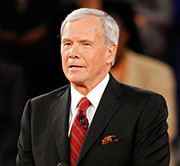- Are You Making This Expensive Thermostat Error This Winter?
- Recognizing the Signs of Hypothyroidism
- 10 Strategies to Overcome Insomnia
- Could Artificial Sweeteners Be Aging the Brain Faster?
- Techniques for Soothing Your Nervous System
- Does the Water in Your House Smell Funny? Here’s Why
- Can a Daily Dose of Apple Cider Vinegar Actually Aid Weight Loss?
- 6 Health Beverages That Can Actually Spike Your Blood Sugar
- Treatment Options for Social Anxiety Disorder
- Understanding the Connection Between Anxiety and Depression
Newsman Tom Brokaw Has Many Treatment Options for His Blood Cancer


Veteran TV journalist Tom Brokaw’s revelation that he is battling a type of cancer that attacks white blood cells in bone marrow has triggered an outpouring of sympathy and concern.
But cancer specialists say survival rates for the disease — multiple myeloma — have been rising in recent years as new drugs make inroads against the malignancy.
“There are actually many treatment options available [for multiple myeloma],” said Dr. Amrita Krishnan, director of the multiple myeloma program at the City of Hope National Medical Center in Duarte, Calif.
Those treatments range from chemotherapy, radiation and stem cell transplants to the intravenous delivery of bone-strengthening medications known as bisphosphonates.
“And since the introduction of several novel chemotherapy agents in 2003 and 2005, survival has gone up dramatically,” Krishnan said. “Many people get treated, and then carry on with some sort of normalcy.”
How things unfold for Brokaw, who is 74, will depend on a number of factors specific to his case.
“First of all, how it goes is driven partly by the stage the patient is in when diagnosed,” Krishnan explained.
A statement released by Brokaw’s network, NBC, last evening said he was first diagnosed last summer at the Mayo Clinic, and his doctors feel he has made good progress against the cancer.
Patients are typically diagnosed with more advanced disease, given the usual absence of clear-cut symptoms with multiple myeloma, according to the American Cancer Society.
“But we really don’t know if that’s true in his case, because today a lot more people are getting blood work as part of their routine physical than used to be the case,” Krishnan said.
“And if that blood work turns up anemia or high protein levels in the blood, they may be sent in for more specific diagnostics for myeloma, particularly if they’re older,” Krishnan said. “And he (Brokaw) is very much in the age category where you would tend to see it, given that the median age for [developing] myeloma is 72.
“Aside from stage, how the disease progresses is also driven by genetics,” Krishnan added. “There is low-risk and high-risk disease in terms of how it behaves once you get it. Survival among very high-risk patients could be two years. But low-risk patients could have a survival of 10 years.”
The cancer society estimates that about 24,000 Americans will be diagnosed with multiple myeloma in 2014 and nearly 11,100 will die from the disease. It tends to affect men slightly more often than women. And the risk is highest among seniors, blacks, those with a family history of the disease, and the overweight or obese, according to the society.
Fighting the cancer hasn’t slowed Brokaw down, however.
He has continued to work as a special correspondent for NBC News since his diagnosis. He completed a documentary on former President John Kennedy while also making appearances on a wide assortment of NBC shows. And he has contributed to ongoing coverage of the Winter Olympics in Sochi, Russia.
Brokaw issued a short statement Tuesday evening: “With the exceptional support of my family, medical team and friends, I am very optimistic about the future and look forward to continuing my life, my work and adventures still to come.
“I remain the luckiest guy I know,” he added. “I am very grateful for the interest in my condition but I also hope everyone understands I wish to keep this a private matter.”
Brokaw started his career with NBC nearly a half century ago, beginning in 1966 as a local news anchor in Los Angeles. By the 1970s, he had risen to become the network’s White House correspondent and eventually became a host of Today. In 1982, he was named co-anchor of NBC Nightly News, before taking over as sole anchor the following year. He held that position until 2004.
Brokaw is also the author of several books, including “The Greatest Generation,” which examined the struggles and strengths of the generation of Americans who came of age during the Great Depression and World War II.
More information
Visit the U.S. National Institutes of Health for more on multiple myeloma.
Source: HealthDay
Copyright © 2026 HealthDay. All rights reserved.










